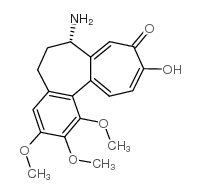Trimethylcolchicinic acid decreases liver fibrosis and cholestasis induced by prolonged biliary obstruction in the rat.
P Muriel, P U Ostoa-Saloma, J A Reyes-Esparsa, L Rodríguez-Fragoso
Index: J. Appl. Toxicol. 17(3) , 145-51, (1997)
Full Text: HTML
Abstract
Colchicine is effective in decreasing hepatic fibrosis. However, several toxic reactions have been reported after colchicine treatment which are attributed to its ability to bind tubulin. The aim of this work is to determine if trimethylcolchicinic acid, which does not bind tubulin, is able to decrease experimental liver fibrosis and cholestasis. In male Wistar rats, the common bile duct was ligated. Administration of trimethylcolchicinic acid (TMCA, 100 micrograms rat-1 day-1, p.o.) began 4 weeks after biliary obstruction and continued for a further 4 weeks. The liver was used for histological and ultrastructural analysis and for collagen quantification (hydroxyproline content). The degradation of Matrigel and collagen (types I and III), as well as plasminogen activator activity, was determined in liver homogenates. Bilirubins and enzyme activities were measured in serum. Trimethylcolchicinic acid was able to improve normal liver histology, ultrastructure, collagen content and biochemical markers of liver damage. It also increased matrigel degradation and plasminogen activator activity. The mechanism of TMCA is probably associated with its ability to increase Matrigel degradation; however, other actions cannot be discarded.
Related Compounds
| Structure | Name/CAS No. | Molecular Formula | Articles |
|---|---|---|---|
 |
Trimethylcolchicinic acid
CAS:3482-37-9 |
C19H21NO5 |
|
Resolution of liver fibrosis in chronic CCl4 administration ...
2005-05-01 [Basic Clin Pharmacol Toxicol. 96(5) , 375-80, (2005)] |
|
Effect of colchicine and trimethylcolchicinic acid on CCl4-i...
1996-11-01 [Pharmacol. Toxicol. 79(5) , 241-6, (1996)] |
|
The role of microtubules in pinocytosis. Inhibition of fluid...
1983-08-01 [Cell Biol. Int. Rep. 7(8) , 593-602, (1983)] |
|
Comparative study of colchicine and trimethylcolchicinic aci...
1996-01-01 [J. Appl. Toxicol. 16(3) , 269-75, (1996)] |